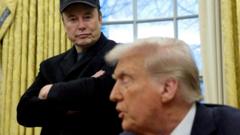The billionaire's remarks reignite debates on neutrality and influence in online platforms.
Elon Musk Targets Wikipedia, Calls for Donation Boycott

Elon Musk Targets Wikipedia, Calls for Donation Boycott
Musk condemns Wikipedia's budget focus, fueling criticisms of perceived bias.
Elon Musk is once again taking a bold stance, this time against Wikipedia, the widely used online encyclopedia. Recently, Musk urged his followers on X to stop donating to the Wikimedia Foundation until they “restore balance to their editing authority.” Musk labeled Wikipedia as “Wokepedia,” reigniting discussions about the platform’s perceived ideological bias.
His remarks followed the release of a graph on X, reportedly from Wikipedia’s annual report, indicating that 29% of its budget was dedicated to “equity” and “safety & inclusion” initiatives. Critics, including Musk, argue that such budget priorities reflect a broader agenda that could influence Wikipedia’s editorial practices.
Musk tweeted, “Stop donating to Wokepedia until they restore balance to their editing authority” alongside a link to further details.
Research has also contributed to this debate. Notably, a study by David Rozado, an associate professor at Otago Polytechnic in New Zealand, pointed out discrepancies in the portrayal of political figures, finding that Wikipedia disproportionately depicts right-leaning individuals in a negative light compared to their left-leaning counterparts.
However, the discourse remains contentious. Jimmy Wales, co-founder of Wikipedia, has consistently rebuffed claims of left-wing bias while advocating for the platform’s dedication to neutrality. Wales and supporters contend that studies suggesting Wikipedia’s “woke” tendencies are anecdotal and do not capture the complexities inherent in collaborative editing.
Musk’s criticism has elicited diverse reactions online, with some social media users applauding his push for accountability, while others cast doubt on his motives, suggesting that calls for “neutrality” may align with his personal beliefs. Regardless of the controversy, his comments have refocused scrutiny on the ongoing challenge of maintaining neutrality and transparency within significant platforms like Wikipedia.
The continuing debate highlights the broader challenge of bias in digital spaces and the need for balanced information in an increasingly polarized world. Given Wikipedia's crucial role as a major knowledge resource, this issue resonates globally, inviting ongoing examination from both critics and defenders alike.
His remarks followed the release of a graph on X, reportedly from Wikipedia’s annual report, indicating that 29% of its budget was dedicated to “equity” and “safety & inclusion” initiatives. Critics, including Musk, argue that such budget priorities reflect a broader agenda that could influence Wikipedia’s editorial practices.
Musk tweeted, “Stop donating to Wokepedia until they restore balance to their editing authority” alongside a link to further details.
Research has also contributed to this debate. Notably, a study by David Rozado, an associate professor at Otago Polytechnic in New Zealand, pointed out discrepancies in the portrayal of political figures, finding that Wikipedia disproportionately depicts right-leaning individuals in a negative light compared to their left-leaning counterparts.
However, the discourse remains contentious. Jimmy Wales, co-founder of Wikipedia, has consistently rebuffed claims of left-wing bias while advocating for the platform’s dedication to neutrality. Wales and supporters contend that studies suggesting Wikipedia’s “woke” tendencies are anecdotal and do not capture the complexities inherent in collaborative editing.
Musk’s criticism has elicited diverse reactions online, with some social media users applauding his push for accountability, while others cast doubt on his motives, suggesting that calls for “neutrality” may align with his personal beliefs. Regardless of the controversy, his comments have refocused scrutiny on the ongoing challenge of maintaining neutrality and transparency within significant platforms like Wikipedia.
The continuing debate highlights the broader challenge of bias in digital spaces and the need for balanced information in an increasingly polarized world. Given Wikipedia's crucial role as a major knowledge resource, this issue resonates globally, inviting ongoing examination from both critics and defenders alike.



















